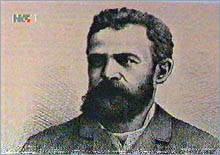
Ivan Zajc
IVAN ZAJC (1832-1914) - Croatian Composer
Ivan Zajc was born in Rijeka and the National Opera House in Rijeka carries his name. Like many
other prodigies, Zajc's talent was evident early in his life and at the age of six he performed in
public, playing the piano and the violin.
His musical career Zajc started in Milan at the Conservatory (1850-55) under the tutelage of S.
Ronchetti-Monteviti (counterpoint & composition), A. Mazzucato (orchestration) and L. Rossi
(dramatic music). Zajc was considered one of the more gifted students and for his graduation
work, composed opera La Tirolese (1855) for which was awarded a first prize and a favorable
comment in the contemporary Milan's newspaper La Fama: "Zajc's music is original,
spontaneous, clear and proper with many beautiful, delightful and vivacious themes. We have
met an artist who displays his skill especially in sections of the choir. .... Although he on a few
occasions imitates Verdi, we cannot begrudge him for that. A number of arias, and whole
sections, a female duet, a characteristic and vivacious choir, a tenor aria and especially the last
scene of the opera in which the composer raises his art to the heights of true emotion and
expresses the catastrophe of the drama in very lively colours and with great passion. The
audience liked the opera very much and received it with great applause".
Even though offered a to be a conductor in the Teatro della Scala in Milan Zajc returned to Rijeka
where he was given the post of conductor and concert master at the Town Theatre Orchestra.
Zajc also taught stringed instruments at the Philharmonic Institute.
In 1862 he went to Vienna, the city where the opera and theatre were flourishing. His very first
work, operetta Mannshaft an Bord (1863) was an enormous success. In Vienna Zajc composed his
first compositions to Croatian text including the patriotic choral piece To Arms, to arms! (U boj, u
boj) (1866) which he later on incorporated into the opera "Nikola Subic Zrinski".
The demise of the nationalistic Illyrian Movement prompted many prominent Croatian
intellectuals to reawake its ideals. In Vienna Zajc met with progressive Croatian students: Ivan
Dezman, Franjo Markovic, August Senoa, and others. They tried to convince him to leave Vienna
and to return to Zagreb. Bishop Juraj Strossmayer (the founder of Croatian Academy of Arts &
Science, 1866) and the poet Petar Preradovic joined in persuading Zajc to return. Patriotism won,
Zajc left his lucrative position in Vienna, and thus all chances for a secure, brilliant career as a
favorite and popular Viennese and Central-European composer have vanished.
In 1870 Zajc came to Zagreb, only to start his career all over and in a much more uncertain
conditions than in Vienna. He was offered the leadership of the Opera House and Musical
Conservatory. Zajc, almost single-handedly and practically from nonexistence was responsible
for enriching the Opera as an institution of the arts, and in particularly creating a Croatian opera.
(Only one Croatian opera, Vatroslav Lisinski's Love & Malice was performed in public before his
arrival).
Zajc has a prolific musical opus: 87 works were written for the musical stage; in his early career
some were composed in Italian and German, but after his arrival to Zagreb, he uses exclusively
Croatian librettos. Through his operas and diverse compositions he educated the audience and
became a model for other Croatian composers, as well as a torchbearer of patriotism. This is most
clearly evident in his so-called trilogy: King Mislav , Ban Leget and Nikola Subic Zrinski. In a
period when the ongoing political struggle of Croats against Hungarians was everywhere
present, Zajc's works (operatic trilogy, choral song Glasna Jasna, Zrinsko-Frankopanska, aria To
my Homeland etc.) stressed the greatness of patriotic heroism as a true pledge for the victory of
the people, their aspirations and ideals.
"Zajc played an important part in the development of Croatian Music. Acting over a long period
of time as an organizer, conductor, teacher and composer, he began and successfully carried out
the struggle against dilettantism and for promoting a serious approach to the composition and
performance of music, thus paving the way for new and significant achievements of Croatian
musical culture in the 20th century. Because of all of these efforts Zajc deserves great credit." He
died in Zagreb on December 16th 1914.
Information taken from: Andreis, Josip, The Encyclopaedia of Music, and No 3, Lexicographic
Institute "Miroslav Krleza" Zagreb 1977